Common Mistakes inEnglish 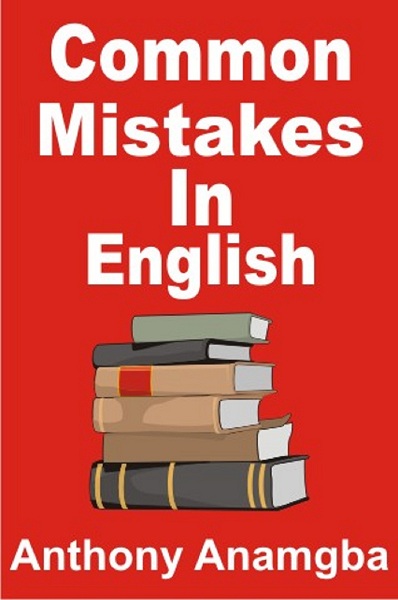 Common Mistakes inEnglish By Anthony Anamgba Smashwords Edition Copyright 2017 Anthony Anamgba Smashwords Edition, All Rights Reserved No part of this publication may be reproducedin any form or by any means-electronic, mechanical, photocopying,recording or otherwise, without the prior permission of the author,who is the copyright owner. Any person who does any unauthorizedact in relation to this publication may be liable to criminalprosecution or civil claims for damages. Thank you for downloadingthis book. Contents References About Anthony Anamgba Other Books by AnthonyAnamgba Connect with AnthonyAnamgba Common Mistakes in English introduces you toEnglish Language. It clearly explains nouns and discusses thecorrect use of nouns. It examines determiners and shows you how touse determiners correctly.
Common Mistakes inEnglish By Anthony Anamgba Smashwords Edition Copyright 2017 Anthony Anamgba Smashwords Edition, All Rights Reserved No part of this publication may be reproducedin any form or by any means-electronic, mechanical, photocopying,recording or otherwise, without the prior permission of the author,who is the copyright owner. Any person who does any unauthorizedact in relation to this publication may be liable to criminalprosecution or civil claims for damages. Thank you for downloadingthis book. Contents References About Anthony Anamgba Other Books by AnthonyAnamgba Connect with AnthonyAnamgba Common Mistakes in English introduces you toEnglish Language. It clearly explains nouns and discusses thecorrect use of nouns. It examines determiners and shows you how touse determiners correctly.
It analyzes pronouns and explains how touse pronouns correctly. It appraises verbs and instructs you on howto use verbs correctly. It evaluates adjectives and shows you theorder that adjectives are expected to follow. It discusses adverbsand throws light on how to position adverbs so that they cancorrectly qualify other words. It teaches you prepositions andcasts light on the correct use of prepositions. It explainsconjunctions and shows you how to use conjunctions correctly.
It analyzes sentences, discusses thesentence patterns and sheds light on how to make correct sentences.It examines the mistakes in concord like the subject-verbdisagreement, pronoun-antecedent disagreement and shift inconstruction. It will help you to increase your vocabulary throughthe word roots, prefixes, suffixes and registers. It shows you howto choose the right words when you speak and write English. Itexplores the common mistakes in writing letters and essays. And itcontains hundreds of questions designed to enable you master allthe relevant aspects of English Language. The author is a non-fictionwriter.
He has written a crop of good books on Commerce, Economics,English, Government and Politics. He is good at writingintroductory books on several disciplines. His books start atelementary stage and progress, in some places, to intermediatestage. His books are first-rate study guides. He writes in a waythat makes the books interesting and easily understandable. He thanks many writers, editors and publishers whohave contributed towards the successful publication of thisbook.
Anthony Anamgba Nouns Noun is a name of a person, place, animal orthing. Noun names persons like Peter, child and man. It namesplaces like London, river and library. It names things like bed,truck and mat. And it names concepts like happiness, truth andbeauty. The bold-typed words are nouns: Water is essential to life .
The hill was covered with trees . Peter is a professional footballer . Noun is of different types. They are proper,common, abstract, collective, countable and uncountable nouns.Proper noun is the name of a specific person, place or thing. Thefirst letter of any proper noun is put in a capital letter whereverit is used in a sentence. Proper noun hardly allows an article likea, an, or the before it.
Proper noun hardly takes a plural form byadding -s to it. Proper noun is a name of a person likePeter, Anthony or Stella. It is a name of a place like London andParis. It is a name of a day of week like Monday and Friday. It isa name of a month of year like January and December. And it is aname of a specific thing like River Nile and English Language.
Common noun is a name shared by things ofthe same class or kind. Common noun is different from a proper nounbecause its first letter is not put in a capital letter except whenit is used to begin a sentence. Common noun also differs from aproper noun because it is a general name of thing. For instance, Peter and Anthony are propernouns. Their common nouns are persons, men or boys. Similarly,London and Lagos that are proper nouns can be called towns orcities.
Town and city are common nouns. Other examples of commonnoun are goat, teacher, flower, house, plate, spoon and key. Abstract noun is a name of thing that cannotbe seen, heard or touched. Abstract noun does not have a materialexistence. It has an abstract existence. If a word is used as anabstract noun, an indefinite article like a or an must not be keptbefore it.
Abstract noun does not take a plural form and cannot bechanged from its singular form to a plural form. Examples ofabstract noun are happiness, beauty, sadness, sympathy, honesty,bitterness, calmness and righteousness. Collective noun is a name of a group ofsimilar things or persons in a similar circumstance. Collectivenoun names a group or a class acting as a unit. It is followed by asingular verb if the whole body, and not the individual members ofthe group, is being referred to. If the individual members of acollective noun are referred to, the collective noun will befollowed by a plural verb.
Examples of collective noun areaudience, family, jury, team, committee, congregation, public, herdand flock. Countable noun is a name of a person orthing that can be counted or numbered. Countable nouns allow thearticle a, an, or numerals before it. They are not given a massinterpretation. They can be pluralized or changed from singular toplural, as in boy-boys and goat-goats. Other examples aretable-tables, egg-eggs, chair-chairs, bed-beds, plate-plates,spoon-spoons, car-cars, computer-computers, and door-doors.
Uncountable noun is the name of a thing thatcannot be counted or numbered. It is given a mass interpretation.Uncountable noun does not allow the determiners like a, an, one,every, each, two, ten, and many before it. Rather it allows thedeterminers like some, little, much, the, a lot of, a piece of, andan item of. Uncountable nouns cannot be changed from singular toplural. Examples of uncountable noun are milk, equipment, bread,butter, information, ink, water, air and earth. There are some nouns that are both countableand uncountable nouns.
This means that they cut across the countand non-count classes. Examples of count and non-count nouns arestone, yam, difficulty and talk. There are two number forms in EnglishLanguage. They are singular and plural. A noun is said to besingular if it refers to one thing. A noun becomes plural if itrefers to more than one thing.
The countable nouns have bothsingular and plural forms. The singular countable nouns can bechanged to the plural countable nouns through several methods. For most singular nouns, you should add -sto them, as in pencil-pencils, book-books, television-televisions,car-cars, song-songs, and train-trains. For singular nouns ending in s, ch, sh, xand z, you should add -es to them, as in bus-buses, glass-glasses,church-churches, rush-rushes, box-boxes, and brush-brushes. For singular nouns ending in o, you shouldadd -es if the letter o comes after a consonant like g, b, c, d, f,g, h, or j. And add -s if the letter o comes after a vowel like a,e, i, o, or u, as in hero-heroes, veto-vetoes, radio-radios, andzoo-zoos.
Some exceptions to the rule include memo-memos andpiano-pianos. For singular nouns ending in f or fe, youare expected to change f to v, and add -s or es, as in life-lives,leaf-leaves, self-selves, and knife-knives. For singular nouns ending in y, you areadvised to change y to i, and add -es if the letter y comes after aconsonant. You should keep the letter y and add -s if the letter ycomes after a vowel, as in fly-flies, lady-ladies, duty-duties,army-armies, reply-replies, baby-babies, boy-boys, andray-rays. For some singular nouns, the plural isformed by making no changes, as in deer-deer, sheep-sheep,fish-fish, swine-swine, cod-cod, and salmon-salmon. For some nouns called irregular nouns, thereis not a hard and fast rule for changing them from the singular tothe plural.
Next page
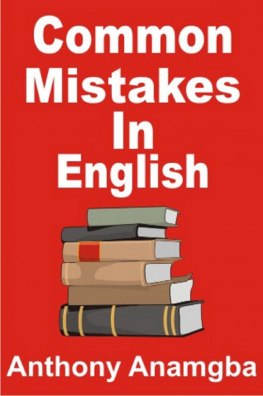
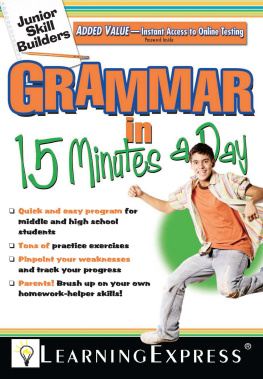

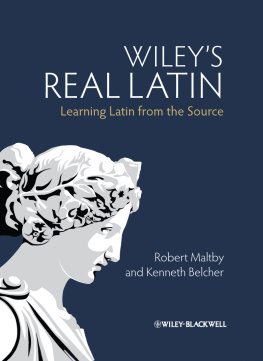
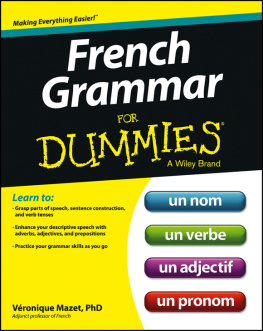
 Common Mistakes inEnglish By Anthony Anamgba Smashwords Edition Copyright 2017 Anthony Anamgba Smashwords Edition, All Rights Reserved No part of this publication may be reproducedin any form or by any means-electronic, mechanical, photocopying,recording or otherwise, without the prior permission of the author,who is the copyright owner. Any person who does any unauthorizedact in relation to this publication may be liable to criminalprosecution or civil claims for damages. Thank you for downloadingthis book. Contents References About Anthony Anamgba Other Books by AnthonyAnamgba Connect with AnthonyAnamgba Common Mistakes in English introduces you toEnglish Language. It clearly explains nouns and discusses thecorrect use of nouns. It examines determiners and shows you how touse determiners correctly.
Common Mistakes inEnglish By Anthony Anamgba Smashwords Edition Copyright 2017 Anthony Anamgba Smashwords Edition, All Rights Reserved No part of this publication may be reproducedin any form or by any means-electronic, mechanical, photocopying,recording or otherwise, without the prior permission of the author,who is the copyright owner. Any person who does any unauthorizedact in relation to this publication may be liable to criminalprosecution or civil claims for damages. Thank you for downloadingthis book. Contents References About Anthony Anamgba Other Books by AnthonyAnamgba Connect with AnthonyAnamgba Common Mistakes in English introduces you toEnglish Language. It clearly explains nouns and discusses thecorrect use of nouns. It examines determiners and shows you how touse determiners correctly.